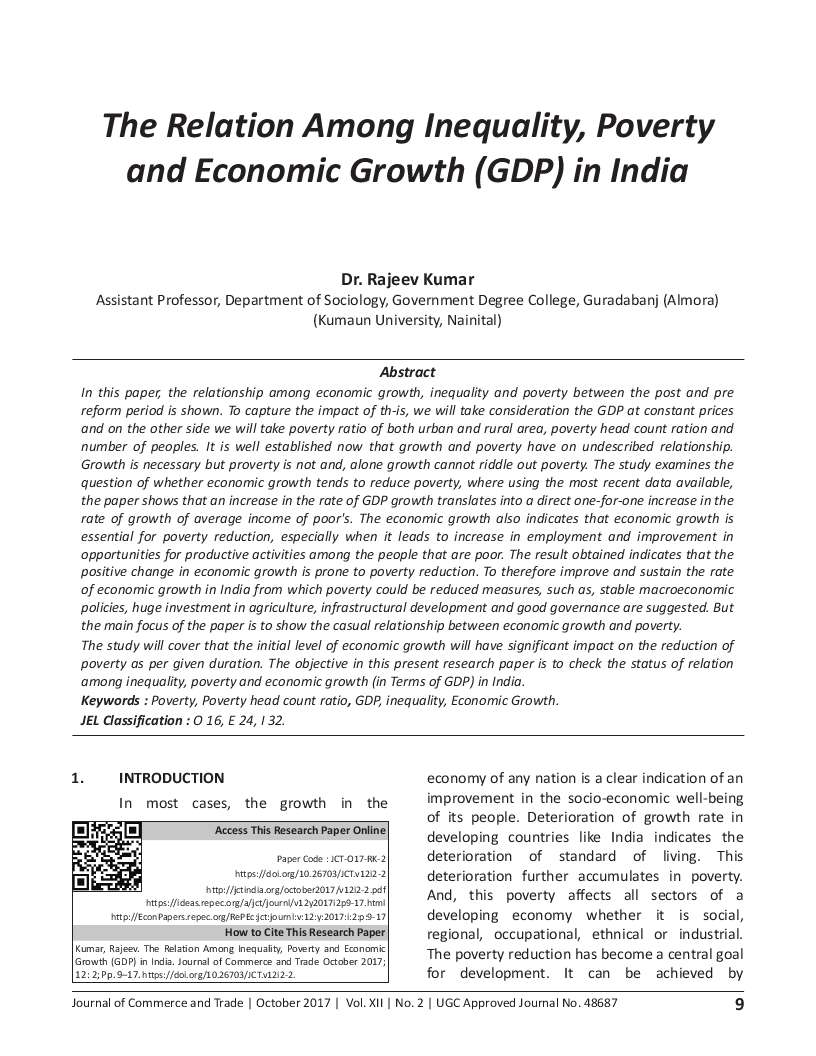The Relation Among Inequality, Poverty and Economic Growth (GDP) in India
DOI:
https://doi.org/10.26703/jct.v12i2.138Keywords:
Poverty, GDP, Inequality, Economic GrowthAbstract
Growth is necessary but proverty is not and, alone growth cannot riddle out poverty. The study examines the question of whether economic growth tends to reduce poverty, where using the most recent data available, the paper shows that an increase in the rate of GDP growth translates into a direct one-for-one increase in the rate of growth of average income of poor's. The economic growth also indicates that economic growth is essential for poverty reduction, especially when it leads to increase in employment and improvement in opportunities for productive activities among the people that are poor. The result obtained indicates that the positive change in economic growth is prone to poverty reduction. To therefore improve and sustain the rate of economic growth in India from which poverty could be reduced measures, such as, stable macroeconomic policies, huge investment in agriculture, infrastructural development and good governance are suggested. But the main focus of the paper is to show the casual relationship between economic growth and poverty. The study will cover that the initial level of economic growth will have significant impact on the reduction of poverty as per given duration. The objective in this present research paper is to check the status of relation among inequality, poverty and economic growth (in Terms of GDP) in India.
JEL Classification : O 16, E 24, I 32.
Downloads
Metrics
References
Ahluwalia, M., N.G. Carter, and Hollis B. Chenery, 1979. "Growth and Poverty in Developing Countries." Journal of Development Economics. 3:307-342.
Agarwal, Himanshu, & Dwivedi, R. (2011). Effective Micro Finance through the Joint Role of Banks and Insurance Companies: A Tool for Poverty Reduction and Employment Generation. In Steering Excellence in Business Knowledge. Faculty of Commerce and Management Studies, University of Kelaniya,. https://doi.org/10.5281/zenodo.3464669
Atkinson, Anthony B., 1991. "Comparing Poverty Rates Internationally : Lessons from Recent Studies in Developed Countries" World Bank Economic Review 5-1 : 3-21.
Robinson, Sherman, 1986. "A Note on the U-hypothesis Relating Income Inequality and Economic Development". Americal Economic Review 66 : 437-440.
Aku, P.S. Ibrahim, M. J. and bulus, Y.D. (1997) Perspective on Poverty Alleviation Strategies in Nigeria. In Proceedings of the Nigerial Economic Society Annual Conference on Poverty Alleviation in Nigeria 1997. Ibadan : NES : 41-54.
Atoloye, A.S.F. (1997) Strategy for Growth-led Poverty Alleviation in Nigeria. In Proceedings of the Nigeria Economic Society Annual Conference on Poverty Alleviation in Nigeria 1997 : Ibadan : NES : 569-585.
Adelman, I. and Morris, C. T. (1971) Economic Growth and Social Equity in Developing Countries, Stanford University Press, Stanford, CA.
Ahluwalia, M. S. (1976) "Inequality, Poverty and Development", Journal of Development Economics Aitchinson, J. and J.A.C. Brown (1966) the Lognormal Distribution, Cambridge : Cambridge University Press
Anand, S. and Kanbur, S. M. R. (1984) "The Kuznets process and the inequality development relationship", Journal of Development Economics, 40, 25-52
Atkinson, A. B. (1970) "On the measurement of Inequality" Journal of Economic Theory, Vol 2.
pp 244-263.
Bhagwati, J. N. (1988). "Poverty and Public Policy." World Development 16 (5) : 539-654.
Acharya, Shankar (2003), India's Economy : Some Issues and Answers, Academic Foundation.

Downloads
Published
How to Cite
Issue
Section
License
Copyright (c) 2017 Dr. Rajeev Kumar

This work is licensed under a Creative Commons Attribution 4.0 International License.














